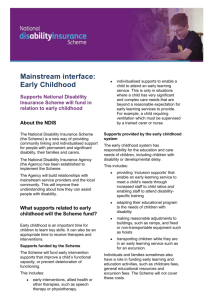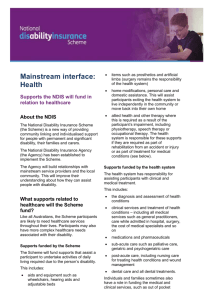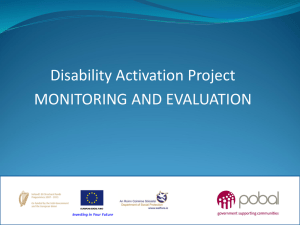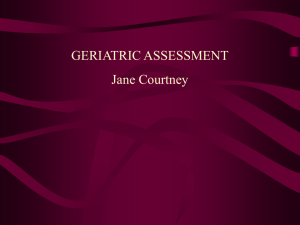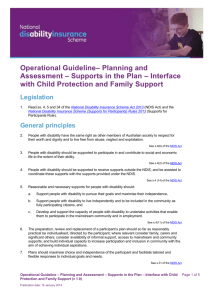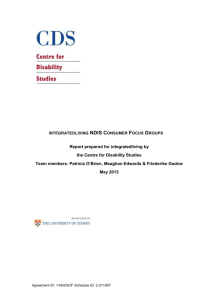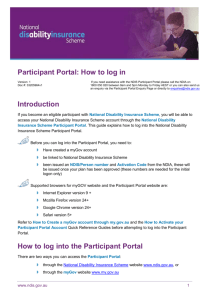Fact sheet: Supports the NDIS will fund in relation to education
advertisement
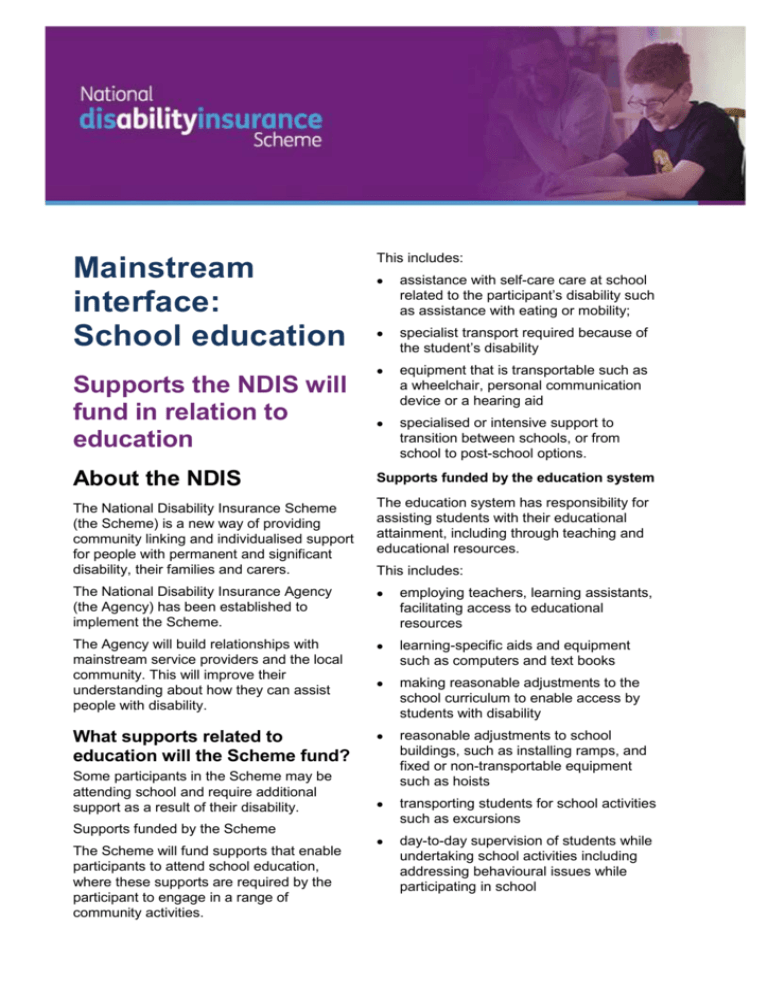
Mainstream interface: School education Supports the NDIS will fund in relation to education This includes: assistance with self-care care at school related to the participant’s disability such as assistance with eating or mobility; specialist transport required because of the student’s disability equipment that is transportable such as a wheelchair, personal communication device or a hearing aid specialised or intensive support to transition between schools, or from school to post-school options. About the NDIS Supports funded by the education system The National Disability Insurance Scheme (the Scheme) is a new way of providing community linking and individualised support for people with permanent and significant disability, their families and carers. The education system has responsibility for assisting students with their educational attainment, including through teaching and educational resources. The National Disability Insurance Agency (the Agency) has been established to implement the Scheme. employing teachers, learning assistants, facilitating access to educational resources The Agency will build relationships with mainstream service providers and the local community. This will improve their understanding about how they can assist people with disability. learning-specific aids and equipment such as computers and text books making reasonable adjustments to the school curriculum to enable access by students with disability What supports related to education will the Scheme fund? reasonable adjustments to school buildings, such as installing ramps, and fixed or non-transportable equipment such as hoists transporting students for school activities such as excursions day-to-day supervision of students while undertaking school activities including addressing behavioural issues while participating in school Some participants in the Scheme may be attending school and require additional support as a result of their disability. Supports funded by the Scheme The Scheme will fund supports that enable participants to attend school education, where these supports are required by the participant to engage in a range of community activities. This includes: Individuals and families sometimes also have a role in funding education-related supports, such as purchasing school uniforms, paying school fees and excursion fees. The Scheme will not cover these costs. What will change for participants who are attending school? Assistance with self-care in school The cost of assistance with self-care in school for the Scheme participants will be included as part of a participant’s package. Usually this will be paid to the student’s school to provide assistance with self-care. The Agency is working with education systems to sort out the arrangements for how assistance with self-care in school will be purchased. This includes how the funding will work where assistance with self-care at school (funded by the Scheme) is delivered by the same person that assists a student with their learning (funded by the school). Initially, schools will continue to provide assistance with self-care to participants. The Agency will work with the participant and the school to determine the level of assistance with self-care needed and how this can best be delivered. Transport to and from school Getting to and from school is the responsibility of families and the education system. For some participants, their disability means that they cannot be transported to school by family or friends or travel independently on public or school transport. For these participants, the Scheme may fund the cost of travelling to and from school. In many jurisdictions, the education system currently manages a specialist school transport system for students with disability. The Agency will draw on the existing transport schemes which remain in place for ndis.gov.au 16 January 2014 the early stage of the trial. The Agency will work closely with participants and education systems to identify options for participants who are not able to access existing transport schemes. What happens if the school doesn’t fund the supports I need? If the school or education system is responsible for a support, the Scheme cannot fund that support, even if the school or the education system does not provide it. However, the Scheme may still able to provide assistance to participants for example, a Local Area Coordinator can assist the participant to make contact and discuss their needs with schools or education providers where appropriate. What happens next? Participants and their families will discuss their education goals with the Agency as part of their planning conversation. The participant’s plan will include the supports the Scheme will fund for participants and those supports which are the responsibility of the education system. More information Visit ndis.gov.au Email enquiries@ndis.gov.au Call 1800 800 110* Monday to Friday, 9.00am to 5.00pm EST. For people with hearing or speech loss: - TTY: 1800 555 677 - Speak and Listen: 1800 555 727 - For people who need help with English TIS: 131 450 * 1800 calls are free from fixed lines; however calls from mobiles may be charged.

